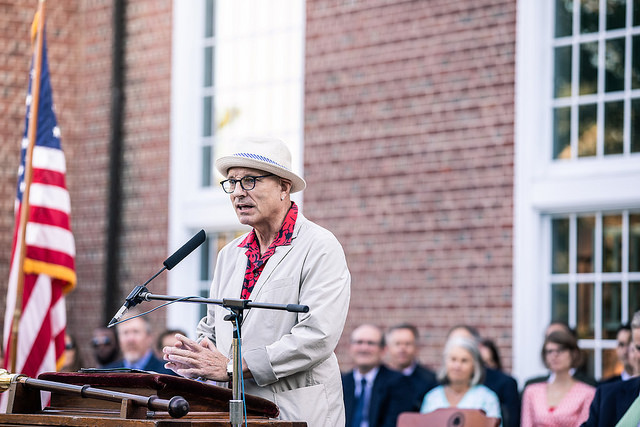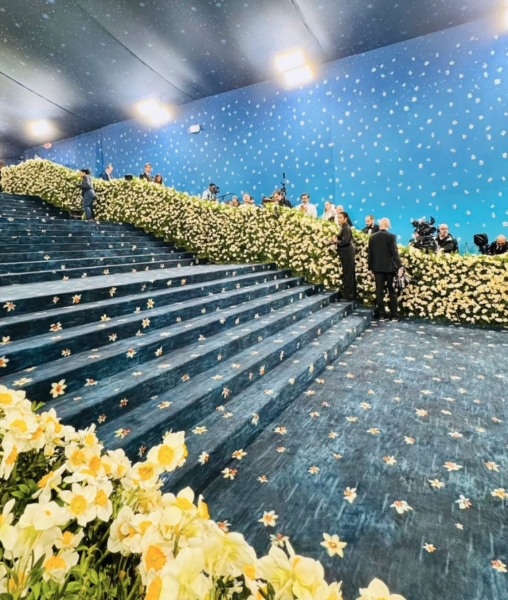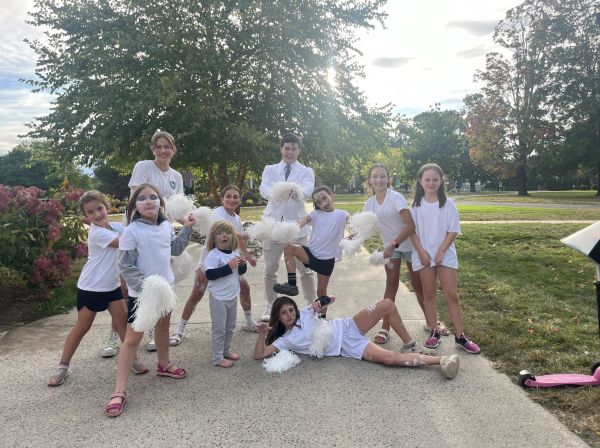Renowned Hollywood Producer Chic Eglee Visits Campus
Chic Eglee leaned back in his chair in room 39 of the Schoolhouse on a Friday afternoon at 2:30 and laughed as he noted that being a student at Williston Academy in 1970 was almost the same as it was at the turn of the twentieth century.
“You could tell that there had been very little change between the time we were there and like 1908,” he said, grinning. “It was very conservative. I wouldn’t say it was an especially nurturing environment.”
Even though it wasn’t nurturing for him, with mandatory chapel and a stricter dress code of jacket and tie, he admitted that it prepared him immensely for his career, winning him an Emmy and a Peabody award, among other accolades. On Friday, September 14, he shared his story with Williston students during classes and at Convocation.
During Eglee’s long and impressive career, he worked on shows like NYPD Blue, The Shield, Dark Angel, and St. Elsewhere.
He wasn’t always in the entertainment industry, however. After his 1974 graduation from Yale, Eglee thought he wanted to attend law school. While working in Washington, D.C. for Connecticut Congressman Abraham Ribicoff, he realized his discontent for the district.
“It was kind of after Watergate, so at that time Jimi Hendrix was making much more sense to me than Washington politics,” he said.
So, Eglee followed his college girlfriend out to California to try to make a name for himself. He did not take to the West Coast.
“I stayed there for a year and really hated it,” he said. “I hated the sunlight. It was just like this pervasive too bright light. I hated the landscape, too. So, I escaped to back to Yale to teach film.”
After Eglee’s return to Yale he quickly moved to New York City, which he noted was a “giant toilet” during the 1970s.
“A lot of people look back with nostalgia,” he told the class. “Like my daughter! She looks at it through this rosy lens of history because it really was the beginning of like punk rock and hip hop, but it was awful.”
Eglee returned to California because he concluded that if he was going to be broke he “might as well not freeze to death.”
Los Angeles saw him bounce around in entertainment, working at venues like strip clubs, which he later realized helped him when writing and producing shows.
“Being able to call on those experiences as a writer helps get your words to jump off the page and come alive,” he explained, although he noted that his parents were concerned with his career path.
“They honestly questioned if I moved out to [Los Angeles] to be closer to Charles Manson or something,” he joked.
After finally finding his footing in the industry and working on several popular shows like St. Elsewhere and Moonlighting, Eglee became interested in the streaming industry.
“As new media emerges, writing changes,” he explained. “The content is shaped on how people watch it. We don’t have to worry about reintroducing things to the watcher, because they’ll have watched the previous episode an hour or a day ago.”
It is clear that Eglee prefers to be in tune with today’s culture. He spoke to classes while wearing a pair of perfectly white Yeezys, and in his Convocation speech to the students he spoke of rappers with ease.
He told students that he expected them, like him, to look back on their time at Williston as both the best of times and worst of times.
“Under [best of times], you’ve got Kendrick Lamar, Travis Scott, Drake, Nicki [Minaj], and, yes, Cardi B. Who, after sober reflection, I have to admit, is not without skills,” he said.
In all seriousness, he said, some of his best times centered around the broader horizons that Williston offered him.
“At an early age, I learned that this great nation of ours exists in a whole world of nations,” he said. “My freshman roommate was from Venezuela and spoke fluent Spanish. I developed friendships with kids from Liberia, Libya, Thailand, and Egypt.”
Eglee ended his Convocation speech with simple advice for students:
“Be critical in your examination of ideas, and creative in your search for solutions,” he said. “Do not be afraid of failure. From my own experience, I can tell you it is a far better teacher than success.”
Ellie Wolfe is a senior from Northampton Massachusetts. In her free time, she enjoys going for runs and hanging out with her friends, and runs The Willistonian...













